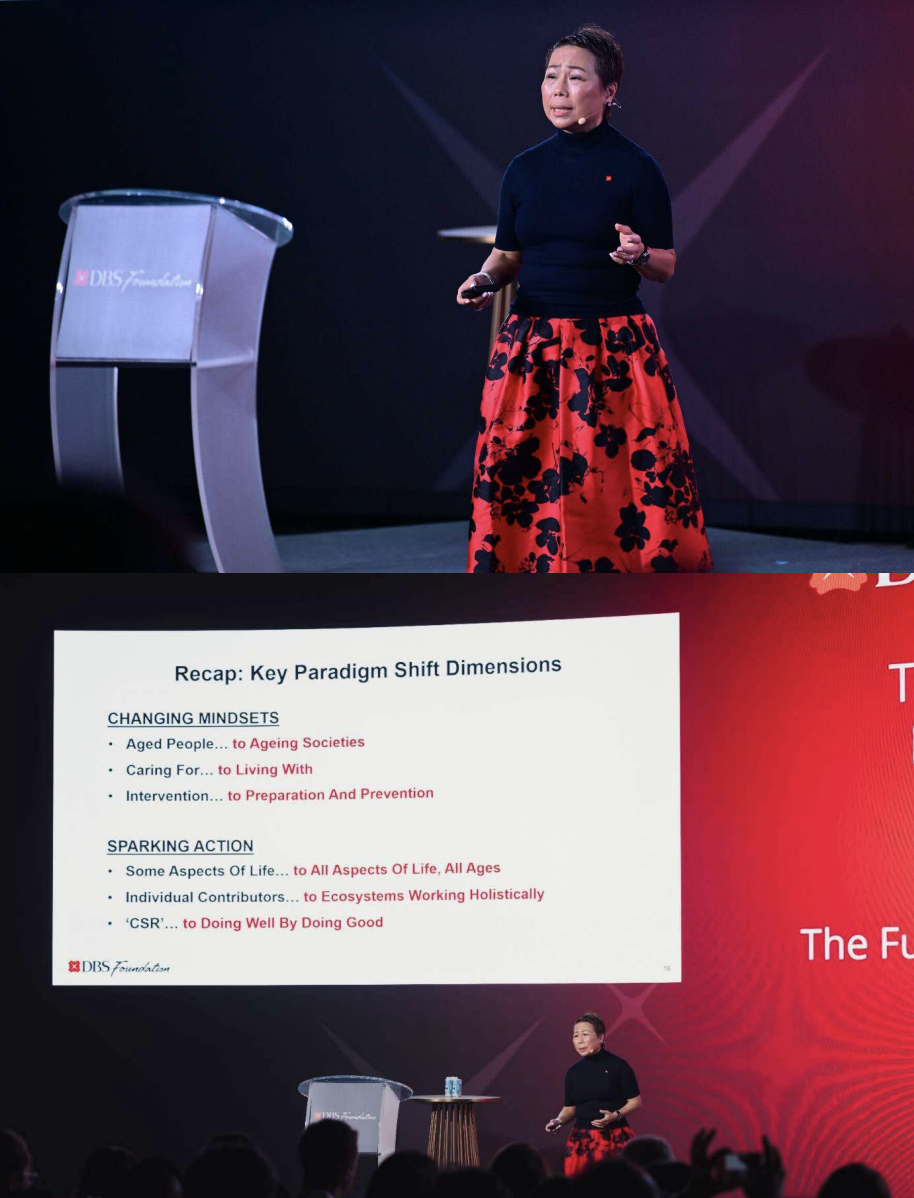Reimagining Ageing: Turning Asia's Longevity Challenge into
Opportunity
Insights from DBS
Foundation's
Inaugural Impact
Beyond Summit
As Asia grapples with the reality of a rapidly ageing population, the longevity revolution is not just
about adding years to life, but ensuring these years are healthy, active, and filled with purpose.
This vision was central to our inaugural DBS Foundation Impact Beyond Summit which was held
earlier this month at the transformed Pasir Panjang Station—a historic landmark reimagined for the
event—the summit embodied the belief that even familiar, established structures can be reenergised
with new purpose.
Over 300 business leaders, longevity experts, and social sector representatives joined us and heard
from luminaries like President Tharman Shanmugaratnam, DBS CEO @Piyush Gupta, Dan Buettner of
Blue Zones fame, Professor John Eu-Li Wong of National University of Singapore & National
University Health System, amongst other leading voices.
Recognising the Ageing Population as a Reality
By 2050, countries like China and Singapore will have one senior for every two working-age adults,
with Taiwan and Hong Kong facing even more extreme ratios. As these changes take hold, the
challenge is clear: how do we move beyond seeing ageing as a problem to unlock its potential as an
opportunity for innovation and impact?
Shifting the Paradigm: Embracing Ageing as an Asset
One of the greatest challenges in rethinking ageing is changing perceptions. Too often, ageing is seen
as a period of decline and dependency. But what if we saw older generations as invaluable
resources—rich in wisdom, skills, and resilience, ready to contribute to society?
The summit highlighted the importance of viewing ageing as an opportunity for growth, where
older adults actively contribute to communities and economies. This perspective aligns with the
principles of Dan Buettner's “Blue Zones,” where longevity in five key locations across the
world is shaped by physical activity, strong social connections, whole-food diets, and low
levels of stress.
In Singapore's “Blue Zone 2.0,” policies are crafted to promote healthy, purposeful ageing. The
narrative must shift from “caring for” to “living with” older adults, who are eager to stay
engaged, learn, and contribute. This change, supported by leaders across sectors, calls for
recognising older generations as active partners in shaping the future.
Karen Ngui, Managing Director and Head of DBS Foundation, delivers her opening address at the
Impact Beyond Summit 2024.
Redefining Longevity: Enabling People to Thrive
Longevity should not only be about extending life, but about improving its quality. It's about thriving,
not just surviving. A key focus should be bridging the gap between lifespan—the total years of
life—and healthspan—the years spent in good health.
The path forward lies in shifting from intervention to prevention, promoting healthier lifestyles,
balanced nutrition, and proactive healthcare from an early age. It's not just about physical
health—mental, emotional, financial, and social health are equally important. To ensure a
sustainable future, we must create environments that support well-being at every stage of life,
enabling people to stay engaged and active in society.
Preparing for Ageing: Taking Proactive Action
President Tharman Shanmugaratnam emphasised the importance of early preparation, noting that
ageing is a predictable societal shift and should not be addressed at the last minute. He highlighted
the need for proactive measures to create systems and mindsets that turn the challenges of ageing
into opportunities for intergenerational collaboration and growth.
A proactive mindset, as he noted, lays the foundation for an empowered ageing society. This shift
requires collective action from governments, businesses, and individuals to ensure older generations
are equipped to play vital roles in our communities. Echoing this perspective, DBS CEO Piyush Gupta
underscored the need to focus not only on longevity but on quality of life, calling for systems that
help people live well while addressing macroeconomic challenges such as dependency ratios and
sustainable pension systems.
Fostering Collective Responsibility: Engaging Businesses, Governments, and Individuals
Longevity is not something that can be tackled by individuals alone—it's a collective responsibility.
Governments must anticipate future demands by strengthening healthcare systems, building
age-friendly infrastructure, and supporting workforce inclusion for older adults.
Businesses play a vital role in tackling the challenges of an ageing society. Companies can
start thinking about integrating social impact into their core strategies, driving long-term
value while contributing to societal change.
This commitment to social responsibility should not be limited to financial contributions alone.
It must also encompass the dedication of time, talent, and expertise. By creating solutions that
support healthier lifestyles, develop age-friendly technologies, and foster inclusive
environments, businesses can directly contribute to improving the quality of life for older
adults.
Thought leaders engage in insightful discussions at a breakout session during the Impact Beyond
Summit 2024.
Driving Change for Lasting Impact
The time to act is now. Governments must adopt long-term, forward-thinking policies, businesses
must weave social responsibility into their core strategies, and individuals must champion greater
intergenerational collaboration. By working together—through smart policies, purposeful business
models, and engaged communities—we can transform the ageing challenge into an opportunity for
profound societal change.
It's critical that we each contribute to shaping a future where all generations are supported, valued,
and empowered to live active and purposeful lives. Together, we can build a society where longevity
is seen not as a challenge, but as a chance to create lasting, meaningful impact.
Keen to learn more?
Visit the DBS Foundation website to explore our
initiatives, the Impact Beyond Award and the full Impact Beyond Summit Report (available on 6 December
2024)

